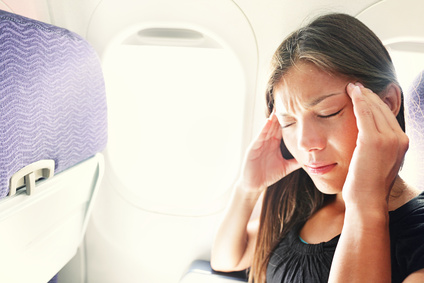
Newsletter Subscribe
Enter your email address below and subscribe to our newsletter

Enter your email address below and subscribe to our newsletter

Let’s face it, common colds suck! But flying with a head cold is even worse. If you’ve ever had the misfortune of boarding a plane with a head cold, you know all too well how uncomfortable the whole experience can be. Congestion and sinus pressure can be extremely painful during flight, not to mention damaging to your ears.
Although the safest solution is to avoid air travel altogether, the reality is we can’t always wait for a cold to dissipate before taking a flight. Symptoms can linger for days, and you may be stuck with no other option other then to fly. Some airlines will allow you to rebook with a small fee, while others will provide no alternatives.
So what do you do if you find yourself congested with a plane to catch? Here are some tips to help you get through it!
As soon as you feel the onset of a cold, start fueling your body with plenty of vitamins and rest. Allowing your body the chance to heal is your number one weapon against fighting any virus. Symptoms such as congestion and sinus pressure usually occur a few days after your first symptoms appear, so if you know you have a flight to catch start giving your body what it needs right away.
Try taking Black Elderberry syrup or Echinacea. These natural remedies are believed to help lessen the severity and length of your cold symptoms. Be sure to eat clean and arm your body with the appropriate nutrients. Avoid alcohol and fatty foods and be sure to get some sleep!!
It is extremely important to stay hydrated when you are sick. Fluid prevents dehydration and thins the mucus, helping to unclog stuffy noses. Since airplanes lack humidity due to the pressurization in the cabin, it is common for our mucus membranes to dry out during flight, making it harder for our systems to flush out the germs.
Drink plenty of fluid before flying and be sure to board the plane with lots of water in hand. Stick to clear fluids while avoiding alcohol, coffee and soda. These products can actually cause dehydration and worsen your symptoms.
It is extremely important that you clear your ears before flying. When our sinus tissue or Eustachian tubes swell we become congested, making it difficult to equalize air pressure. Combining this with air travel can result in a wide range of problems varying from mild pain to permanent ear damage.
The best solution is to take a decongestant 30 minutes prior to departure, ensuring that your medicine has enough time to take effect before takeoff. If you have a long flight, be sure to take another tablet while airborne and at least 30 minutes prior to descent. Nasal sprays are also an effective way to keep your nasal passages moist, however be sure to read label before combining any sprays with decongestion tablets.
Many people believe that chewing gum can help alleviate sinus pressure during takeoff and landing. This may be true, however when you’re sick, chewing gum can actually dry out your mouth and throat. Instead, try sucking on a throat lozenge that contains Benzocaine, or opt for a sugar free candy. This will help to maintain the saliva in your mouth, while providing some relief during ascent and descent.
Earplugs are another way to equalize pressure during flight. Be sure to insert your earplugs before the plane door closes and pressurization begins. You can remove them during max altitude, however be sure to reinsert plugs prior to descent, keeping them in until after you have landed and the plane door reopens.
Many frequent fliers suggest purchasing a product from your drugstore called “Earplanes”. This product is supposed to help relieve ear discomfort, clogging and popping by naturally filtering and regulating air pressure. For only $5 US, it definitely couldn’t hurt right!!
It can be very difficult to clear your ears when they are plugged. Swallowing, yawning or blowing your nose during takeoff and landing can help to keep the Eustachian tubes open. Practice different breathing techniques such as holding your nose, closing your mouth and exhaling gently. You will likely feel a slight popping or ringing sound while air is being forced into your Eustachian tube, helping to alleviate pressure.
If you are forced to fly with a head cold, be sure to follow these steps to help lessen the severity of your symptoms. There are real risks involved when flying congested and you can actually do serious damage to your hearing. Consider all of your options before traveling and when in doubt, talk to your doctor. No flight is worth the risk, so be safe and stay healthy. Happy flying!!